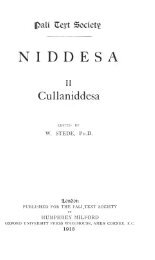Lessons In Practical Buddhism - Sirimangalo.Org
Lessons In Practical Buddhism - Sirimangalo.Org
Lessons In Practical Buddhism - Sirimangalo.Org
You also want an ePaper? Increase the reach of your titles
YUMPU automatically turns print PDFs into web optimized ePapers that Google loves.
causes us to suffer. That is the second noble truth - that's<br />
really all it means, that desire for things to be this way or<br />
that way or for obtaining this or that object - is really the<br />
single, solitary cause for all suffering.<br />
The wisdom that we're trying to gain is a very simple set of<br />
truths; for that reason itself it can be quite difficult to<br />
internalize. Our minds aren't ordinarily programmed to<br />
accept simplicity; our minds are programmed to make things<br />
complicated out of habit. When we hear that all of our<br />
experience is unsatisfying, we immediately come up with<br />
various objections, theories about how happiness can<br />
actually be found in this or that experience. We may think it<br />
to be a very pessimistic teaching, due to our long-acquired<br />
views and beliefs about how satisfying the objects of our<br />
desire must be. As a result, we miss the important fact that<br />
it's the truth.<br />
No matter how much we believe, wish, pray, or theorize<br />
otherwise, when we investigate for ourselves, observing<br />
experience empirically - when we stop speculating and start<br />
observing, stop believing and start learning - we cannot deny<br />
the simple truth that nothing in this universe can possibly<br />
bring us true happiness or peace. When we see reality<br />
clearly for what it is, we cannot deny the observable truth<br />
that clinging to anything is cause only for greater suffering.<br />
<strong>In</strong> meditation practice, our inherent inclination towards<br />
complexity can become a real problem. We try our best as<br />
teachers to bring our students back to simple observation,<br />
asking questions that help them really come to understand<br />
reality for what it is - simple questions, like: "Are the<br />
movement of the right foot and the movement of the left<br />
foot one thing or separate things?"<br />
This is a very simple question with a very simple answer, and<br />
yet immediately the mind tries to analyze it, turn it into a<br />
philosophical or theoretical question. The purpose of the<br />
questions we ask meditators is to test whether the meditator<br />
is able to relate to reality objectively, or whether they are<br />
caught up in projections, judgements and views. The first<br />
step in meditation is to attain right view, which means giving<br />
up all theoretical views and beliefs. Right view is not really a<br />
view at all; it means to just see things simply as they are, to<br />
128












